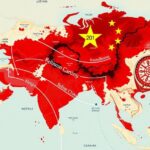Myanmar’s Civil War: A Nation in Crisis
Myanmar is currently embroiled in a devastating civil war stemming from the military coup in February 2021, which resulted in the ousting of the elected government. The conflict has led to over 6,000 civilian deaths and widespread humanitarian crises, with more than three million displaced. Noteworthy geopolitical interests complicate interventions, while the junta plans a controversial election for 2025, amidst fears of escalating violence.
Myanmar is engulfed in a chaotic civil war following the military junta’s coup on February 1, 2021, which ousted the democratically elected government of Aung San Suu Kyi. The coup triggered widespread protests, quickly evolving into brutal conflicts involving over 2,600 rebel groups and the military. The armed struggle has led to severe humanitarian crises, including substantial civilian casualties and widespread displacement, with more than three million people affected.
The historical context of Myanmar reveals deep-rooted ethnic conflicts stemming from independence in 1948. The nation is home to 135 ethnic groups, each pursuing varying degrees of autonomy. Initially, the military maintained dominance, conducting multiple coups, the most recent being in 2021, when they justified their actions with allegations of election fraud. This ongoing power struggle has resulted in a fragile state plagued by violence and instability.
Numerous rebel factions have emerged since the coup, fueled by local activists and politicians who are now engaging in guerrilla warfare against the military. Ethnic armed organizations have fortified their positions, gaining control of significant territories, border crossings, and resources. Although these groups have established strategic alliances, the overall coordination remains tenuous, leading to occasional conflicts among them.
Civilian casualties have been alarmingly high, with the UN estimating over 6,000 deaths and rampant human rights violations, including torture and executions. Concurrently, food shortages loom as analysts warn of impending famine, impacting millions due to a severely compromised economy. The humanitarian situation necessitates urgent attention from the international community to address the growing crises.
Geopolitical dynamics further complicate the crisis, particularly with China and India maintaining interests in the region while avoiding direct intervention. China, while supporting the military, also engages with ethnic groups, hoping to stabilize the border areas. Meanwhile, the Association of Southeast Asian Nations (ASEAN) struggles to formulate a cohesive response to the situation.
Looking ahead, Myanmar’s junta has announced plans for a 2025 election, perceived as a questionable legitimacy maneuver. Critics argue that it may provoke further violence and insecurity, as the military seeks to solidify control. Ultimately, whether the junta can sustain its power amidst burgeoning rebellion and international scrutiny remains uncertain, presaging a potentially protracted conflict. The international community is urged to craft comprehensive strategies addressing the complex facets of this ongoing civil war.
The ongoing civil war in Myanmar is the result of historical grievances tied to ethnic diversity and centralized governance. After gaining independence from British colonial rule in 1948, the country has faced continuous conflicts fueled by unfulfilled autonomy promises to various ethnic groups. The military’s longstanding dominance, marked by coups and suppression, has fostered widespread disenfranchisement and violence, leading to the current humanitarian crisis. A nuanced understanding of these factors is crucial for grasping the complexities of the conflict.
The civil war in Myanmar continues to devastate the nation as over 2,600 rebel groups vie for control against a militarily entrenched government. Severe humanitarian crises result from rampant violence and political instability, with the international community called upon to address these urgent matters. Despite the junta’s plans for an election in 2025, the future remains uncertain, foreshadowing a potential escalation of violence and further suffering for the civilian population.
Original Source: www.nzz.ch








Post Comment